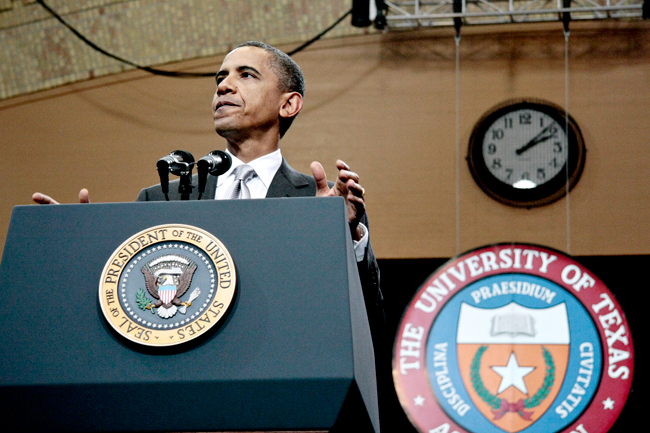Last week, a young woman walked along the polished, concrete corridor dividing the Tower’s left façade from the Flawn Academic Center on her way to the on-campus polling location. She held her cell phone to her ear. “Mom, mom,” she said, “I’m going to vote, who do I vote for?”
In 2008, UT students, moved by candidate Barack Obama’s call to action, energized this campus. Their enthusiasm appears, however, to have been a temporary diversion, not a permanent departure. In 2008, during the Democratic primary, Obama came to UT-Austin for a debate, and received a standing ovation from a roaring crowd.
Today, increased numbers of UT students don’t think much or often about the presidential election, and many are not persuaded that either Obama or Romney can lift this country from its current woes. Based on the past four years, college students have no good reasons not to expect to live life in a leaner, more stagnant version of the previous century. Yet they still hold out hope they will enjoy the lives their parents lived, if not better.
College students’ conflicting perspective is much like Obama and Romney’s, who, despite sounding on the campaign trail as though they support vastly different visions, share some views. Obama’s Affordable Care Act resembles in many respects the health care law Romney helped enact as Massachusetts Governor. And last month, during the candidates’ final debate about international affairs, they often agreed about U.S. policy overseas.
Ironically, the ballot choices that matter to UT students are the ones the students lining up in the FAC know the least about. Examples abound: Proposition 1 in the City of Austin Special Election asks voters if the general election date should be moved from May to November. Moving the election date will ensure UT students are more likely to participate in the election, which determines Austin’s mayor and city council members. Under the current election schedule, these positions receive little attention from college-aged voters. Proposition 4 entails a change to the city charter that would refashion the city council. Instead of a seven-member body of at-large councilpersons and the mayor, the council would consist of an eleven-member body that would be made up of two at-large councilpersons, eight council members representing specific geographic districts within the city and the mayor. The council structure suggested by the proposition balances local and city-wide interests by including at-large members on the council. Students stand to benefit from the single-member geographic districts mandated by Proposition 4 because the city council members who would represent council districts with high student populations — those that might include West Campus, Riverside and the Forty Acres — would advocate for student issues at city council. And Proposition 1 in the Central Health Tax Ratification Election would increase Travis County property taxes to help fund a new UT medical school and teaching hospital. The addition of such a facility would build on the university’s existing relationship with the Dell Pediatric Research Institute, and would serve to strengthen UT’s already highly ranked nursing, pharmacy, biology and education programs.
During the summer of 2010, President Obama spoke to UT students in Gregory Gymnasium. Standing against a sea of orange, he concluded that education, specifically college education, is the “prerequisite for prosperity and an obligation for the next generation.” He said he wanted the U.S. to produce eight million more college graduates by 2020 and make college more affordable. Obama told the gymnasium full of students about “An economy that is built around three simple words: Made in America, because we are not playing for second place, we are the United States of America, and like the Texas Longhorns, you play for first, we play for first.” Two seasons later, we know that’s not always the case — for our country or our football team. But we still have a responsibility to vote locally and vote intelligently.





















